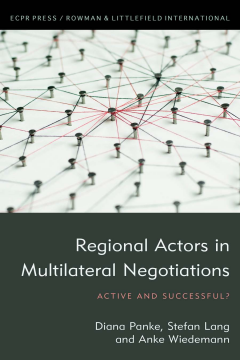
Additional Information
Book Details
Abstract
Since the end of WWII, not only the number of international regimes and organizations, but also the number of regional organisations and groups increased considerably. Today, states are often members of regional and international organisations at the same time and cover similar policies in both. This contributes to a regionalization of international relations since not only states, but also regional actors are active in international negotiations. This book provides a comprehensive analysis of how active and how influential regional actors are in today’s international negotiations. Based on a quantitative analysis of more than 500 international negotiations and three in-depth case studies, the book not only explains why some regional actors are more vocal than others in international organisations, but also why they differ concerning their prospects for success.
Regional Actors in Multilateral Negotiations is one of the first studies of the conditions under which regional actors influence international negotiations and their outcomes. The methodologically sophisticated comparison of more than 60 regional organizations provides important insights on the regionalization of world politics and makes a major contribution to the emerging field of comparative regionalism.
Tanja A. Börzel, Professor of Political Science; Director of the Center for European Integration, Freie Universität Berlin
Diana Panke holds the Chair in ‘Multi-Level Governance’ at University of Freiburg and is the PI of the research project “Nested Games. Regional Organizations in International Organizations”.
Stefan Lang is a PhD candidate at the University of Freiburg. His research interests include international negotiations, regionalism as well as domestic conflicts and interventions.
Anke Wiedemann is a PhD candidate at the University of Freiburg. Her research interests include comparative regionalism, interregionalism and international negotiations.
Regional Actors in Multilateral Negotiations is an insightful and thought-provoking analysis of an important and understudied phenomenon, the participation of regional organizations in international negotiations. Panke, Lang, and Wiedemann generate a series of astute generalizations about the conditions and effects of regional participation which they systematically test using original data. This is a significant and convincing contribution to our understanding of international politics.
Gary Marks, Burton Craige Distinguished Professor of Political Science, UNC-Chapel Hill
This timely book breaks new ground in the study of regional and global politics. The authors successfully combine theory and rigour with innovation and contextual sensitivity in order to provide a nuanced and fascinating account of the regionalisation of multilateral negotiations. In doing so, they lead the way into the next generation of scholarly work on comparative regionalism as well as global governance.
Fredrik Söderbaum, University of Gothenburg, Sweden
Table of Contents
| Section Title | Page | Action | Price |
|---|---|---|---|
| Regional Actors in Multilateral Negotiations | Cover | ||
| Contents | v | ||
| List of Tables and Figures | vii | ||
| Preface | ix | ||
| List of Abbreviations | xi | ||
| 1 Introduction | 1 | ||
| 1.1 The argument and major findings | 4 | ||
| 1.2 The state of the art and gaps | 16 | ||
| 1.3 Chapter outline | 20 | ||
| 2 Theory – Accounting for RO activity and RO success in international negotiations | 23 | ||
| 2.1 Regional actors in IOs – definitions | 24 | ||
| 2.2 Regional activity in international negotiations and multilevel governance systems – the state of the art | 25 | ||
| 2.3 RO success in international negotiations – the state of the art | 40 | ||
| 2.4 Nested negotiations: Expectations of RO activity and RO success in international negotiations | 50 | ||
| Part I: Activity of Regional Actors | 55 | ||
| 3 Mapping regional actor activity | 57 | ||
| 3.1 The construction of the dataset | 57 | ||
| 3.2 Mapping pattern of negotiation activity of regional actors (DV1) | 61 | ||
| 3.3 Empirical puzzles | 73 | ||
| 4 Analysis of regional actor activity | 77 | ||
| 4.1 Methodology | 77 | ||
| 4.2 The independent variables | 86 | ||
| 4.3 Focused analysis | 88 | ||
| 4.4 Comprehensive multilevel analysis | 98 | ||
| Part II: Success of Regional Actors | 105 | ||
| 5 Case Study 1: The negotiations of the South Atlantic Whale Sanctuary | 107 | ||
| 5.1 The IWC: Membership, governance and decision-making procedure | 108 | ||
| 5.2 Activity and success of ROs in the SAWS negotiations in the years 2011, 2012 and 2014 | 114 | ||
| 5.3 Conclusions | 130 | ||
| 6 Case Study 2: The negotiations on the Arms Trade Treaty | 137 | ||
| 6.1 Towards an Arms Trade Treaty | 137 | ||
| 6.2 Empirical analysis: The negotiation dynamics in the ATT case | 142 | ||
| 6.3 Conclusions | 173 | ||
| 7 Case Study 3: The negotiations of the Rome Declaration on Nutrition | 183 | ||
| 7.1 History of the Rome Declaration on Nutrition | 183 | ||
| 7.2 Empirical analysis: The negotiation dynamics on the text of the Rome Declaration on Nutrition | 187 | ||
| 7.3 Conclusions | 203 | ||
| Conclusions | 209 | ||
| C.1 Major findings | 211 | ||
| C.2 ROs in IOs: How to improve active and successful participation | 218 | ||
| C.3 Outlook: Avenues for future research | 223 | ||
| Notes | 225 | ||
| Literature | 267 | ||
| Annex (Chapter 3) | 303 | ||
| Annex (Chapter 4) | 325 | ||
| Annex (Chapter 7) | 401 | ||
| Index | 405 | ||
| About the Authors | 411 |
